This week’s episode of The Expanse is titled “Static.” We all know that static in sci-fi and horror shows is no good right? That it’s always a conduit for evil? This episode sees Miller dealing with the fallout of his trigger-happiness, Amos bonding with a sociopath, Naomi dancing like no one is watching, and Avasarala taking a gamble.
(Spoilers ahead, naturally.)
So in a move that probably won’t cool this cold war down any, Earth blows up Mars’ moon.
What the hell, Earth?
I mean, granted, it’s just Deimos, the smaller moon, but still. 17 people are killed, and this only foments the Martians’ rage toward Earthers. Bobbie Draper attempts to calm her soldiers, while raging at her own commander when he says they aren’t allowed to retaliate. Tempers flare up especially because one of her team is an immigrant from Earth (“take a load off your heavy bones” one of the Martian-born soldiers taunts) and this results in a brawl that almost gets Bobbie sent to the brig. In the end, they smooth over their anger and recommit to each other. This thread is the weakest for me—as excited as I am to see more Martians, I’m finding it a bit overwrought so far, and, without a battle to throw the soldiers into, they seem to be treading water for now.

Meanwhile, on Tycho Station, Holden continues yelling at everyone, sounding like a petulant child instead of a leader. Only Naomi and Fred keep him from attacking Miller, who drawls, “Got something you need to get off your chest, there?” Fred thinks he understands why Miller did what he did, and he sets him free, but he also keeps his gun and tells him to get the hell off Tycho. Miller and Amos talk, and Amos is also pretty much on Miller’s side, but, “Captain always gets a little jumpy if you kill someone without asking first.” Plus, since Amos thinks Holden is “as close to righteous as it gets out here” he feels obligated to uphold the ban on Miller.
Holden and Naomi get in a fight over Holden’s feelings, and Naomi and Alex make sure the Roci will be back to fly another day.
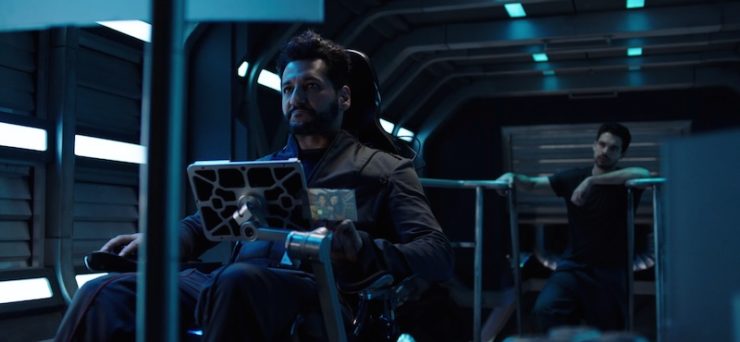
Holden and Johnson attempt to interrogate the scientist they brought in from the Science Station, with Holden taking the lead by trying to appeal to the man’s empathy and bringing up his mother’s terminal illness. This does not work.
Alex goes back to work, running and re-running the flight simulation, tormenting himself with the thought of the people who died on his watch. Naomi goes out dancing with Johnson’s #1. Miller crashes with his crazy water-thief friend, and finds out that there’s a “a new banger, straight out of Eros”—Belter DJs are taking sounds coming off of Eros Station and turning them into dance music as a kind of tribute. Are these the screams of the dying? Or is something else going on on that station? Miller investigates, and comes to the Mormons. He wants to hear about the Mormons’ journey, and their ship the Nauvoo.

They learn that the Scientist has been altered, he’s had his empathy essentially hijacked, so he can experiment on people without caring. Amos perks up his ears at this. Amos recognizes a kindred spirit, and goes alone to his cell to describe what he saw when they found Julie Mao’s body. Amos easily wins “Most Disturbing Scene of the Episode.” The scientist becomes extremely agitated, and tells Amos all about the proto-molecule. He reports back to Holden that the man is like a pedophile: if you ask him blunt question about doing horrible things to children, he’s not going to respond. Sow him pictures of children, and he can’t stop himself from talking. “Eros is his pedophilia” Amos says, handily winning “Most Disturbing Sentence of the Episode” and Holden tries showing the scientist images of Phoebe station.
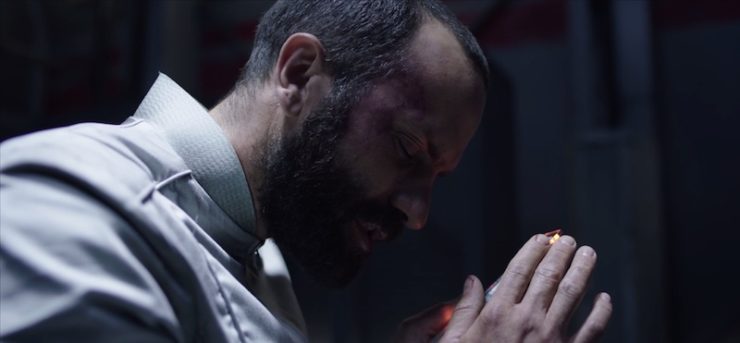
As Amos predicted, the scientist tells them everything they could want to know about the proto-molecule, with a detachment that Holden clearly finds unsettling:
“You infected them and watched them die?
“We watched it work. The proto-molecule is the first evidence of a tree of life apart from our own. It didn’t come with an instruction manual.”
Avasarala’s spy gives her a clear channel to Johnson, and she reaches out to him, despite the treason. “If you have any cards left in your hand, the time to play them is now.” He immediately decides to help, which is incredibly sweet, really: in the midst of all this brutality, two of the most hardened players are willing to risk their own safety to avert a war.
Finally, the scientist figures out that the proto-molecule is pulsing, and maybe…counting down?
To what?
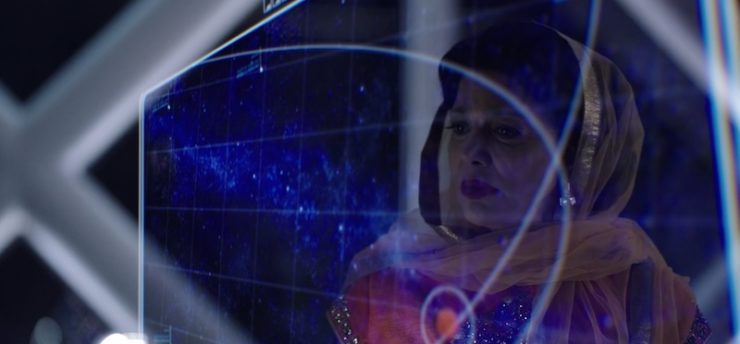
Meanwhile, back on Earth, Avasarala receives the intel from Johnson, and responds with a resounding “What the fuck?” and Miller walks back into Johnson’s office to negotiate a deal to take care of Eros.
Random Thoughts Drifting in Space
- OK, speaking as someone who was CAPSLOCK excited about Bobbie Draper last week, I’m already getting frustrated with this storyline. The tiff between the members of her platoon felt like manufactured drama rather than anything organic, and after their bang-up introduction, I want to see them in action!
- I would, however, watch an entire episode of Miller trying to be roomies with Diogo. That’s some Spike-living-with-Giles-level shit, right there.
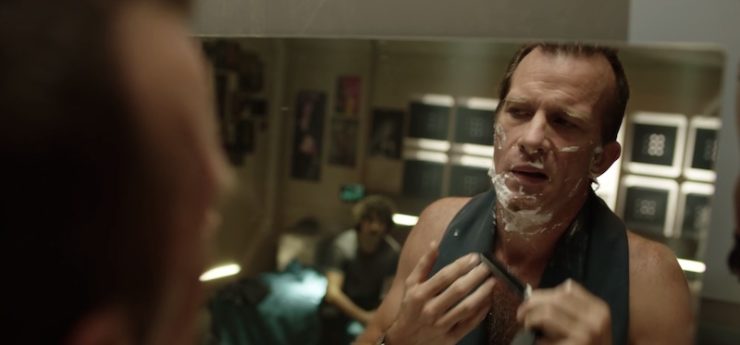
- Am I the only one who likes Belter EDM?
- I also loved the way the show followed each character’s brief time off. Alex and Holden are incapable of letting anything go, while Naomi loses herself at a club for a few hours, and Amos probably derives genuine pleasure from talking to the Scientist.
- Is Amos a sociopath? Is that what’s being implied by his interest in he Scientist? Why is television suddenly nothing but sociopaths?
- Holy crap the Nauvoo is amazing! Getting to see the plan for the Earth-like paradise inside gave me chills. too bad it looks like Miller has a larger plan for it.
Leah Schnelbach will miss that tiny moon. You can find her on Twitter!










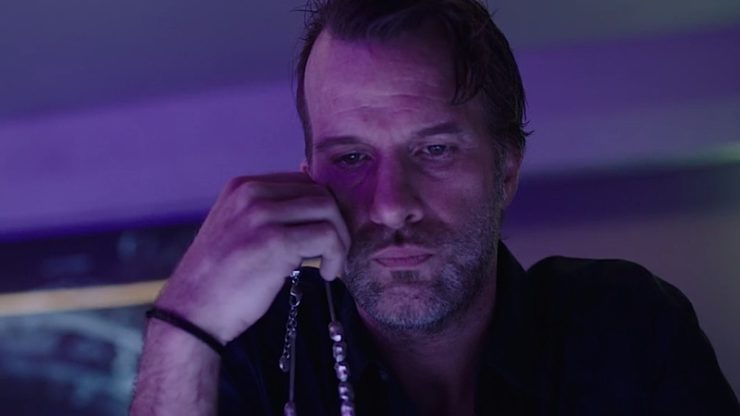
I think finally figured out what they’re doing with Bobbie. Rot13 spoilers for the books:
Fvapr fur’f svanyyl ba ure jnl gb Tnalzrqr, guvf unf nyy orra frg hc sbe gur fynhtugre bs ure fdhnq. Jr pner zber nobhg gurz abj guna jr qvq va gur obbx jura gurl jrer cenpgvpnyyl anzryrff aq snpryrff. Oboovr’f Znegvna angvbanyvfz naq zvyvgnapl unir nyfb orra uvtuyvtugrq gb znxr ure pbagenfg jvgu Ninfnenyn gung zhpu zber fgevxvat. V pnaabg jnvg sbe ure jbeyqivrj gb or punyyratrq naq sbe gur gjb bs gurz gb fgneg jbexvat gbtrgure (jvyy gur Tnalzrqr nggnpx or gur frnfba svanyr fgvatre?)
Really? Only one comment (which I, for one, have no clue how to decipher)?
All the Earth-Mars-Belter politics does not interest me much. I am really more intrigued now that we have evidence of actual communication and learning by the proto-molecule.
Will they find that the “music” is subverting/preparing the minds of those who listen to respond to the work of the molecule? If the molecule lifeform is learning and adapting, does that mean that its initial presentation of invasive blue crystals was just a previous learned behavior in order to cause evolution in something other than a carbon-based lifeform?
I’m onboard with the discovery process.
I really worry for this show because it’s great and deserves an audience but the viewing figures seem to be really poor. Or are they for syfy? I just don’t know. Babylon 5 didn’t get great viewing figures either but back then networks were far more forgiving and let a show run for (most) of its course before pulling the plug, i’m aware it barely made season 5; and considered a classic by any correct thinking person. But now? Now they are ruthless and it would be a crying shame to see this prematurely ended. I don’t love it though as yet and i’m fine with that, i don’t want everything to be instant gratification, i’m enjoying the slow burn and it’s easy to see its potential.
@2: ROT13 is a common internet cypher where each letter is rotated 13 spaces down. Often used for spoilers. There are various browser extensions that will encrypt/decrypt for you in-line of whatever page you’re reading. On my mobile device I just copy/paste the text into rot13.com.
https://en.m.wikipedia.org/wiki/ROT13
Amos’ character is shown in another spinoff story of the The Expanse, “The Churn”. Suffice it to say, he is a psychopath, but he is aware of it, and is coming to understand it’s benefits as well as what it takes to appear as a “normal” person within it’s constraints. See Luca Brasi in The Godfather.
Interesting stuff here, but what I found most refreshing was seeing a TV episode that approached interrogation scenes strictly through legitimate techniques — positive appeals, negotiation, understanding the psychology of the subject and figuring out how to make them want to cooperate — instead of using it as an excuse for torture porn. I am so sick of torture scenes. This is how it ought to be done. And it was quite a relief to see Amos figure out the right way to get the guy to open up, rather than just try to beat it out of him as I expected.
@3/politeruin: Babylon 5 was a syndicated show, not network; it was cancelled by its syndicator after four seasons, and its fifth season was picked up by a network, TNT. Networks have historically been very quick on the cancellation trigger, often pulling shows in mid-season, but first-run syndicated shows like B5 had the advantage that the individual stations that picked them up had to buy the entire season as a package, so that each season was guaranteed a complete run, something that would not have been the case for a network show.
If anything, networks today are becoming less quick to cancel shows than they used to be. With more competing sources for programming — not just network and cable but online streaming now — more shows are getting picked up, so any given network has a smaller pool of potential replacement shows competing for the slots that would be opened up by cancellations. And that means it’s often safer these days for a network to keep a show rather than cancel it and risk not being able to find a higher-rated replacement. I’m seeing a lot fewer quick or midseason cancellations on network TV these days than there were in just about any prior decade. Heck, The CW barely seems to know how to cancel a show. They just keep them on the air forever and ever. Supernatural was meant to run 5 years and they just renewed it for a 13th season. They’re even picking up shows other networks cancelled, like Supergirl, or rejected, like Riverdale and Black Lightning.
Ahh yeah, syndication… we don’t do that here so it’s always been a source of confusion as to how it works. I still find it hard to believe tv executives are more forgiving these days, for every show that’s been renewed you can easily find one that has been cancelled after a season or two (still annoyed about agent carter). If it’s not bringing in the expected viewers they will scrap it without hesitation; can you imagine star trek: tng even getting beyond its notoriously bad first couple of seasons these days? The first new trek since the original series, an upstart new cast and heavily criticised for its rehashing of the original’s plots i can’t imagine it would grow into the series it became if broadcast now. Firefly afterall was cancelled after just 11 episodes: admittedly that show does pre-date streaming services. Your point that there are more competing sources of programming says to me that can work to a show’s disadvantage precisely because there is a wealth of options to take viewers elsewhere, if they don’t see it working then they’ll write it off as a failed experiment and try something else.
@7/politeruin: There have always been plenty of show cancellations. It’s not a recent phenomenon, and it’s not an anomaly. No show has ever been guaranteed success; it has to be earned. And no show lasts forever — only as long as it’s profitable. It has always been the case that the majority of TV shows have been cancelled in their first season. It’s just that, because they died so young, we don’t remember them. Because we only remember the longer-lived shows, it creates the false impression that most older shows were longer-lived. It’s a classic cognitive bias.
It used to be a lot more common to kill shows just a few weeks out of the gate — sometimes after 7 or 8 episodes, sometimes as few as 2 or 3 episodes. For example, Deep Space Nine‘s Ira Steven Behr had done a series for ABC in 1987 called Once a Hero, about a comic-book superhero who came to life in the real world and had to deal with the more ambiguous and complicated nature of real life. It sounded like a comedy but it was actually a drama, which was why audiences didn’t know what to make of it. The fourth episode was going to guest-star Adam West as the actor who’d played the superhero on TV and was suing the actual hero for stealing his schtick. I was really looking forward to seeing that one — but the network pulled the show completely off the air after the third episode. And that was before they had DVD season sets that would let people finally see unaired episodes. That and probably other episodes of Once a Hero were made but have never, ever been seen.
And there were plenty of other shows back then that got pulled after similarly short runs. I seem to recall being of the opinion that CBS was particularly guilty of this, because they carried Major League baseball and the season started only a few weeks after the TV season premiered, so new shows would get pre-empted after just a few weeks and wouldn’t get the chance to build an audience, which stacked the deck against them when (or if) they returned.
Come to think of it, the rise of DVD season sets may be part of the reason why more shows these days are allowed to complete their seasons (at least the initial 13-episode order) rather than being shut down in mid-stream. After all, DVD sales are where the bulk of the profits for a TV series probably come from these days, in the same way that rerun syndication used to be. So it’s in the financial interest of the show’s investors, including the networks, to let them complete their seasons.
As for Star Trek: TNG, that was also a first-run syndicated show — in fact, it was the pioneer of the first-run syndicated drama boom that took off through the ’90s. So it was always guaranteed that its complete seasons would be aired, even if renewal for a subsequent season was not guaranteed. Also, TNG’s first two seasons seem bad compared to what came after because what came after was so much better. But compared to the rest of mid-’80s SFTV, early TNG was actually relatively good, because most of the rest of the stuff out there was lame — stuff like V: The Series, Knight Rider, Amazing Stories, Automan, cheesy things like that. There wasn’t much intelligent SFTV around the time except for the Twilight Zone revival, the Starman series, and Max Headroom. (And Once a Hero, somewhat, but that barely made a blip.) That’s why TNG did so well — it wasn’t as good as it (and the rest of SFTV) later became, but it was good by ’80s standards. There were plenty of network shows at the time that were, in fact, cancelled very quickly. Starman lasted one season, Max two very short seasons. The time-travel western Outlaws lasted 12 episodes. Isaac Asimov’s Probe lasted 7 episodes. Something is Out There, Hard Time on Planet Earth, both very short runs. All these shows came out within a season of TNG. I guarantee you, TNG’s longevity had absolutely nothing to do with the era being any less prone to cancellations.
“Your point that there are more competing sources of programming says to me that can work to a show’s disadvantage precisely because there is a wealth of options to take viewers elsewhere, if they don’t see it working then they’ll write it off as a failed experiment and try something else.”
You’re missing the point, which is that networks don’t have as much “something else” to try anymore, because other broadcasters have already picked up most of the prospects. So it’s not as easy for them to give up and try something else as it used to be.
Here we get into the territory of you believe one thing and i believe another and never the twain shall meet. Of course networks have plenty of “something else” to try, there is no end of schlocky tv shows being commissioned, given 1 or 2 seasons tryout and then dumped, you only have to look at alex brown’s regular tv schedule roundup on here to see that. It would take until the heat death of the universe to wade through the hours of genre tv being made now. So i don’t think i’m missing the point really, i’m directly addressing the point that viewers have so much choice over so many platforms that it spreads the audience very thin indeed. I just think that to believe that tv execs have evolved beyond ratings as a marker of success is wholly naive, it’s all about the ratings and always has been, though i wish it weren’t so. No cognitive bias on my part i can assure you, i am well aware plenty of tv got cancelled in the past and that it’s not a new phenomenon but it is more ruthless now when you’re competing for ever more dwindling audiences. There were also far less distractions then as there are now, we’re all aware of attention spans suffering as a result.
As for TNG: it might have been guaranteed a completed season would air but i’m saying that it was by no means guaranteed it would survive more than 1 or 2 seasons if just based on critical reaction, yet the ratings were good i believe.
@9/politeruin: Well, I have read that networks are becoming more inclined to keep shows due to not being confident in their ability to replace them, and the thing I read said that it was partly due to the fact that there were fewer potential replacements available due to all the competing outlets. Of course that also increases the competition for viewers, but it is incorrect to assume those are mutually exclusive factors. They both apply, and it’s a question of where the balance lies. I can’t remember where I read the article so I can’t give you a link to it, but it is not a matter of “belief,” it is merely a matter of reporting what I have read.
And the point about TNG is that it was not a network show, so it doesn’t work as an analogy for network shows like Agent Carter and Firefly. The dynamics and circumstances were different. It was in a different market with different rules. Since a syndicated show is separately purchased by dozens of different stations, there’s no single decision to cancel or renew it. That probably gave first-run syndicated shows a better chance of renewal, since they’d have to be independently dropped by multiple broadcasters, not just one. The fact that they were guaranteed entire seasons also meant they had a better chance to build an audience than a network show that was in danger of being yanked after 6-8 weeks or even less. As I’ve shown, the majority of TNG’s contemporary genre shows were cancelled more quickly than it was. TNG’s longevity was absolutely not a function of its era, because it did much better than other shows of its era. It was partly a function of being first-run syndicated and partly a function of the cachet of Star Trek. And it isn’t really possible to compare it to how a show would perform today, because the first-run syndicated drama market doesn’t really exist anymore; these days streaming TV seems to have taken its place as the main competition to network shows. Again, since the market dynamics and economics are different, there’s no way to make a meaningful one-on-one comparison.
One aspect of the series as a book reader that I’ve enjoyed and came up strongly with the Scientist’s plot is the remix of the extended universe – Paolo (you catch his name very briefly) was the protagonist of ‘A Vital Abyss’, an interstitial novella where he is in a different (but not that different) situation.